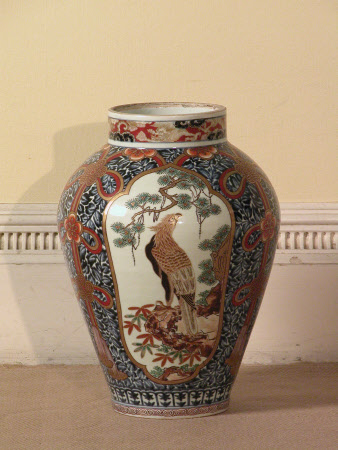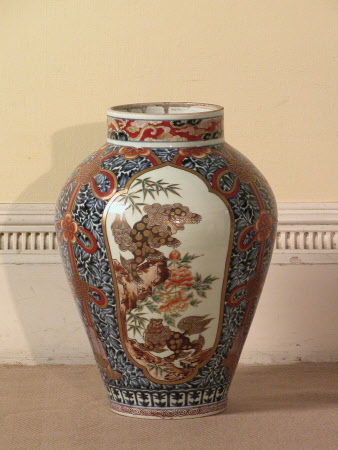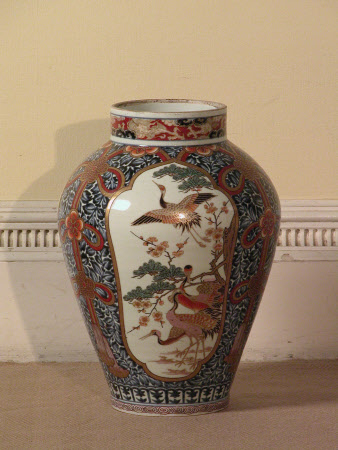Jar and cover
Category
Ceramics
Date
Unknown
Materials
Porcelain, cobalt, enamel, gold
Place of origin
Arita
Order this imageCollection
Saltram, Devon
NT 870947
Summary
Jar, porcelain, baluster-shaped, with a domed lid with a finial in the form of (probably) a Buddhist lion on a rock (lion missing), made in Arita, Hizen Province, Japan, the jar possibly 19th century, the lid 1700-30, decorated in the Imari palette of underglaze blue and overglaze red, green and black enamels and gold with lobed and pointed panels depicting a hawk on a rock under a pine tree on one side and cranes among prunus and pines on the other, separated by knotted tasses and on a ground of dense foliage in underglaze blue, the lid with shaped panels depicting a Buddhist lion and a crane among flowers.
Full description
In the early 18th century, the porcelain made at the Arita kilns for export to Europe became increasingly exuberant (Ferguson 2016). The various motifs had specific meanings in the Japanese context, but on export wares they were used more to create dense visual patterns that appealed to European late-baroque taste. In European interiors jars such as these were used as grand visual punctuation marks, in pairs or as symmetrical sets or ‘garnitures’. The lid on this jar can probably be dated to 1700–30, being more or less identical to the lid on a jar in the Staatliche Kunstsammlungen Dresden, inv. no. PO 5159, with a likely provenance from Augustus II (known as ‘the Strong’), Elector of Saxony (1670–1733) and listed in the 1779 inventory of the Dutch Palace at Neustadt. The jar, however, may be of a later date. Although the style of its decoration is similar to that of the Dresden jar mentioned above, it is somewhat neater and more precise and the outlines of the cartouches are predominantly in gold rather than black and gold. It may be that the original jar (which may have been more like or identical to the Dresden jar) was damaged at some point and replaced with the current jar, which may have been made in the 19th century.
Provenance
Given to the National Trust by Montagu Brownlow Parker, 5th Earl of Morley (1878-1962), 1957.
References
Ferguson 2016: Patricia F. Ferguson, Ceramics: 400 Years of British Collecting in 100 Masterpieces, Philip Wilson Publishers, 2016, pp. 70-1


